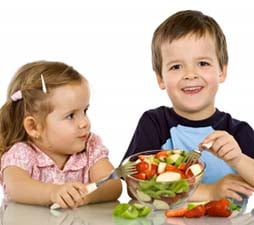Eating Healthy at an Early Age
Our first experiences with food have a large effect on our eating habits for the rest of our lives, so the best time to teach good dietary habits is during the early years. Think about some of your best and worst food habits... don't you wish you had started better habits at age 3, rather than trying to change those habits at age (fill in the blank!)?
Poor diet is associated with many of the chronic diseases we see increasing in the United States, including heart disease, high blood pressure, and diabetes. And, we are seeing diabetes in an alarmingly high number of younger and younger children. Although there have been many new takes on the original food "pyramid" released by the Department of Agriculture in 1992, we know that a healthy diet includes multiple servings of various grains, fruits, and vegetables per day, and limits the amount of saturated fat, cholesterol, sodium, and sugar that we consume.
The best way to teach children about nutrition and healthy eating is with a combination of actual food experiences and fun lessons that back up the real life learning. Hands-on nutrition activities help kids develop healthy eating habits and can complement other learning, for example math, science, language, social development, cooperation, and respect for culture. Then we can support this learning by incorporating food themes into other classroom activities.
Here are some suggestions for promoting healthy eating in young children:
Chef in Training
Help build self-esteem at the same time you teach good eating habits! Allow children to plan, prepare, and serve simple nutritional snacks. Some fun ideas: create smiling faces using rice cakes, cheese and cherry tomatoes; instead of popsicles, make frozen banana sticks or freeze applesauce; make ants on a log (celery sticks with peanut butter and raisins). Kids won’t always like new foods, but if you introduce them in small portions and allow children to participate in in the preparation, it is easier to encourage them to taste their creations.
simple nutritional snacks. Some fun ideas: create smiling faces using rice cakes, cheese and cherry tomatoes; instead of popsicles, make frozen banana sticks or freeze applesauce; make ants on a log (celery sticks with peanut butter and raisins). Kids won’t always like new foods, but if you introduce them in small portions and allow children to participate in in the preparation, it is easier to encourage them to taste their creations.
Food Centered Center
Create a food themed center in your classroom, where all the games and activities in the center are related to food. For example, add food group puzzles, food bingo, food memory games, food themed books, and food posters for decoration.
A Measured Response
As part of your math lesson, look at, and even prepare recipes. If you add 1 Cup of Flour and 1 Cup of sugar, how many Cups do you have now?
Take a Closer Look
Use both real fruits and vegetables and pictures of fruits and vegetables to examine the edible parts of various plants. You could even conduct a taste-test on a variety of raw and cooked vegetables. Children can then discuss the nutritional value of each vegetable. Children can also work together to make vegetable soup and create labels for their own soup cans.
Learn About Different Cultures
In relation to your social studies lessons on other cultures, work in the particular foods from a culture as a theme for a day’s meals and snacks. Discuss at mealtimes how factors such as climate, availability of water, and trade customs might help shape food habits. Learn some of the food words in the language of the culture of the day.
Loaves of Learning
Under adult supervision, young children can bake their own whole grain breads. Make it fun by shaping the dough into different animal shapes. Discuss the importance of integrating whole grains into your diet.
Visit A Local Farm Or Farmers’ Market
This type of outing will put children in touch with local surroundings and create an awareness of how food is grown and sold in places other than a supermarket.
It is important that parents, caregivers, and teachers work together to establish a mutual understanding of how best to meet each child’s individual nutritional needs. And we should try to reinforce our healthy eating lessons throughout the day, both at school and at home. Offering some take-home activities for parents to try over the weekends is a great way to make sure that the lessons carry over to home, as well. Teaching children to eat wisely and moderately is an investment in the future, and establishing healthy eating habits in the early years is not only important, but we now know it can also be fun!
Aside from eating healthy young, what else can you do to support healthy habits in your children. Visit our other nutrition blog articles to learn more.

Angela Nelson, J.D., Ed.M.
Angela Nelson is the creator of the widely-recognized Language Builder Picture Card Series, and the creator and lead author for the Language Builder ARIS curriculum. Angela received her BA and JD from UCLA where she studied and practiced behavior psychology under Dr. Ivar Lovaas, and her Ed.M. at the Harvard Graduate School of Education, with a focus on technology innovation and education. As Founder and CEO of Stages Learning Materials, Angela has created autism, special needs and early childhood curriculum products since 1997. In addition to her duties at Stages, Angela writes for multiple industry publications and is Chair of the Education Market Association.





